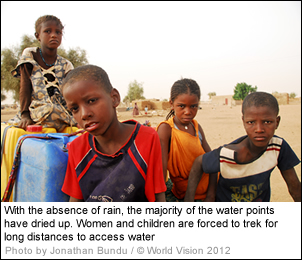Water - a precious commodity in drought stricken communities
Access to clean water is a human right. Safe water is an essential factor in alleviating extreme poverty as targeted by the Millennium Development Goals.
 But with the present drought hitting Mauritania, clean and safe drinking water has become a precious commodity in different communities. With the absence of rain, majority of the water points have dried up. Women and children are forced to trek for miles to access water. “There are no boreholes here, so we and the children will have to walk far to get water,” says Aminata Boye, Head of the Local Cooperative in Beleel Koyle.
But with the present drought hitting Mauritania, clean and safe drinking water has become a precious commodity in different communities. With the absence of rain, majority of the water points have dried up. Women and children are forced to trek for miles to access water. “There are no boreholes here, so we and the children will have to walk far to get water,” says Aminata Boye, Head of the Local Cooperative in Beleel Koyle.
For her villagers, ‘walking far’ equals to 8-9 km; men with their cattle, women and children with jerry cans trekking to get to clean water.
In Mahmoud village, and other villages in the Kiffa Region (approximately 406 km from the capital of Nouakchott), the situation is even worse. Any attempts to dig bore holes in the area proved futile, and closest boreholes are at 10 km away.
“This is not good for us as we have to walk that far, and sometimes when we get there, the water is very dirty because cattle herders would have used it. Our village is 1km from Mali, and they too are suffering drought,” says Sal Hamady, Representative of the Government for Rural Development.
In the height of the water crisis, children are the ones caught in the middle, often at risk of being attacked by wild animals. “My village is far from this water point, but I just have to get water, for even if we don’t have food, water will help us,” says Fatmatou Omar, one of the children.
In all villages visited, apart from the food shortage, clean and safe drinking water has been a concern raised by the communities.